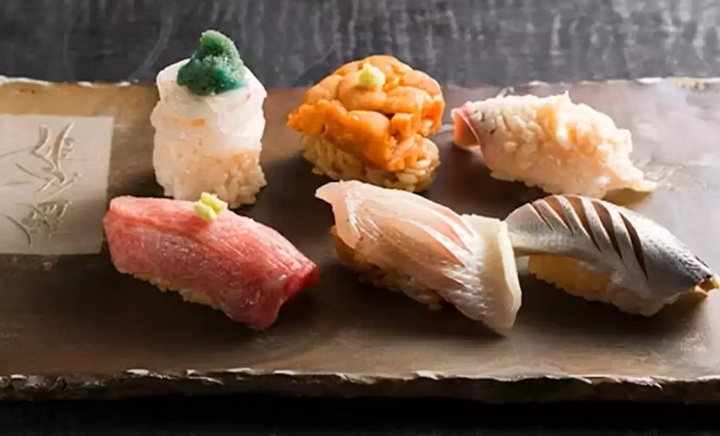The Ultimate Hotel Experience for the Tea Aficionado: Hotel 1899 Tokyo

Hotel 1899 Tokyo is a stylish tea-themed hotel located in Shimbashi, central Tokyo. This accommodation facility has an interior design, amenities, and cafe menus inspired by Japan's tea culture.
Welcome back to Tokyo Ryokan Stories! I’m Roza Akino, and I live and work in Japan. Thanks for joining me on my journey to explore the lesser-known inns and hotels of Tokyo! We are now approaching the end of the series, with two lodgings left to explore.
Today’s stay at Hotel 1899 Tokyo will be one of these. The hotel is a 10-minute walk from Shimbashi station on the Yamanote line, known to be an area that is busy during the day with business people and quiet at night.
Hotel 1899 Tokyo has piqued my attention as a long-time practitioner of chanoyu (traditional tea ceremony) and lover of tea because the entire hotel is designed around the concept of tea. On the first floor, it has a tea-themed café called CHAYA 1899 TOKYO, which offers various drinks and food made with tea leaves.
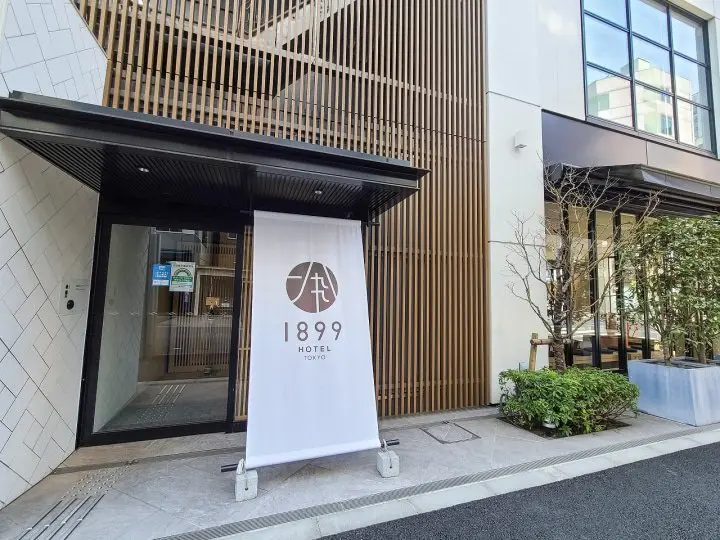
The entrance to the hotel
I arrive a little early to enjoy a bit of tea time before my interview. The outside design is very sleek, with a touch of modern-traditional design visible in its use of thinly-spaced wooden bars running along the length of the building, reminiscent of Kyoto machiya architecture.
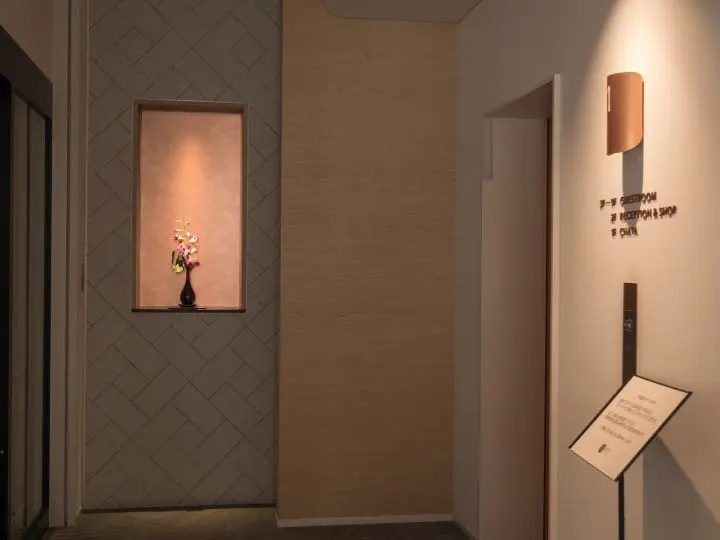
The entrance displays a flower arrangement in an alcove
As soon as I step into the entryway, I am surrounded by the pleasant smell of incense. The café is right next to the elevator leading up to the hotel lobby.
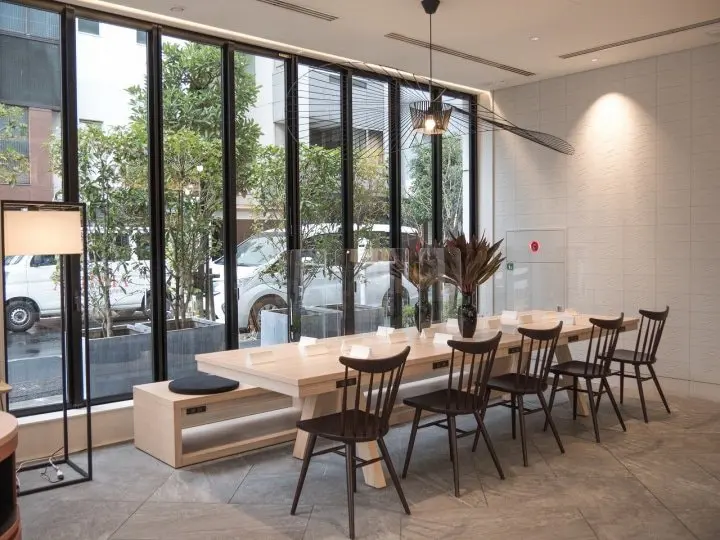
The color scheme is simple, there is abundant use of black and white, shiny polished metals in copper, bronze, and silver colors. The use of light-colored wood for the benches, tables, and shelves makes the room bright and pleasant. Large windows let in ample sunlight and most of the seats have an electric outlet, so it’s a great place to get some work done as well.
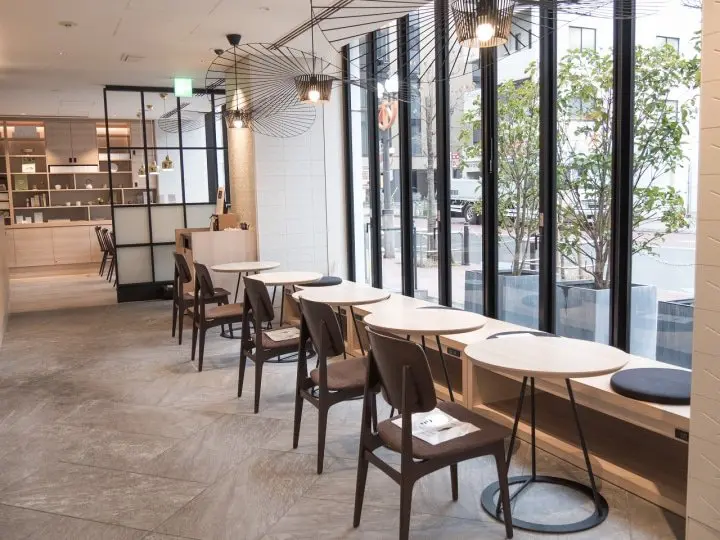
For someone familiar with tea the chic lights shaped in a distorted version of a traditional umbrella used during tea gatherings outside stand out as a nod to tea culture, as do the boxes traditionally used for storing and transporting tea lining the top of the order counter.
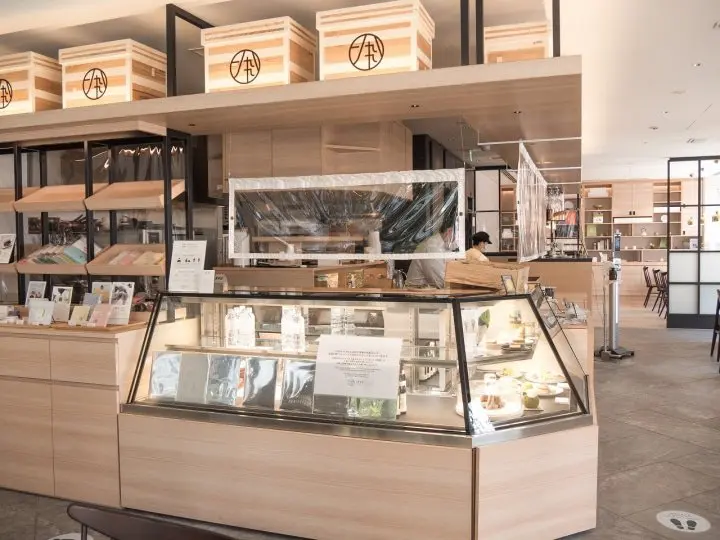
The boxes above the counter are also part of the tea-themed design, made to resemble those that are traditionally used for storing and transporting tea
A quick look over the menu and I’m surprised to find some interesting items, in particular the tea sodas. However, I decide to go for a warm drink and order the café-recommended sencha (a type of green tea) blend of 6 teas.
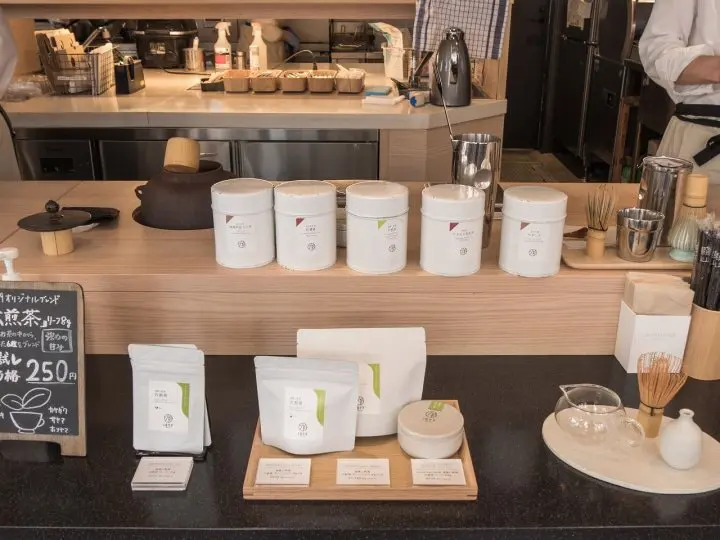
Various teas—all the tea served here uses hot water boiled in a traditional iron kettle, kama
The tea comes in a traditional kyusu pot, with an extra thermos so you can enjoy 2-3 brews.
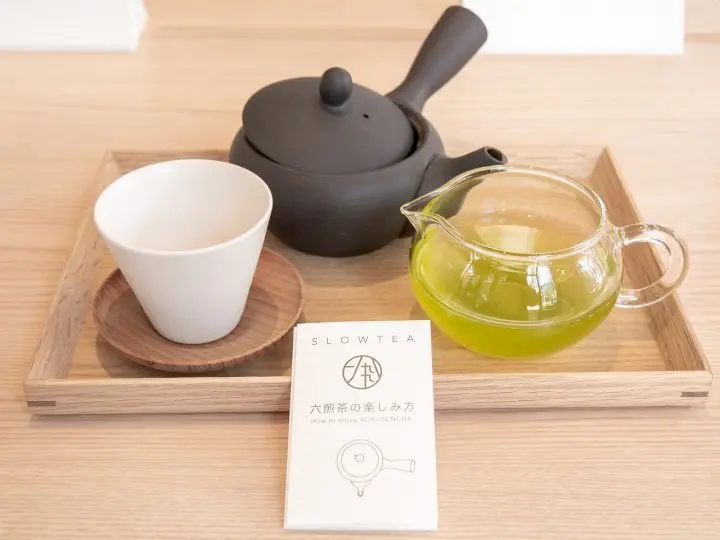
A blend of six types of sencha
I’m lost in my own world as I enjoy the sweet aftertaste that this mild green tea provides when Director and General Manager Tomoharu Katsuno-san comes to greet me.
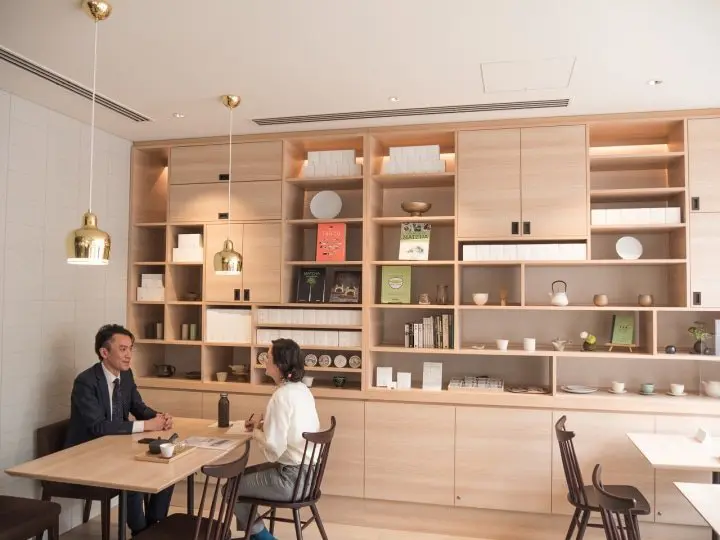
Katsuno-san and I
We sit down at one of the tables on the far side of the café. The wall next to us is decorated with various teas, pottery, and books on tea.
Hotel 1899 Tokyo gets its name after the year that the hotel’s parent company, Ryumeikan, was founded.
Ryumeikan, originally running ryokan in the Ochanomizu area, now runs several hotels, as well as a restaurant based around the concept of tea. Ryumeikan decided to expand on this concept, and the result was Hotel 1899 Tokyo: a lifestyle hotel that offers a unique space where guests can fully experience and enjoy tea.
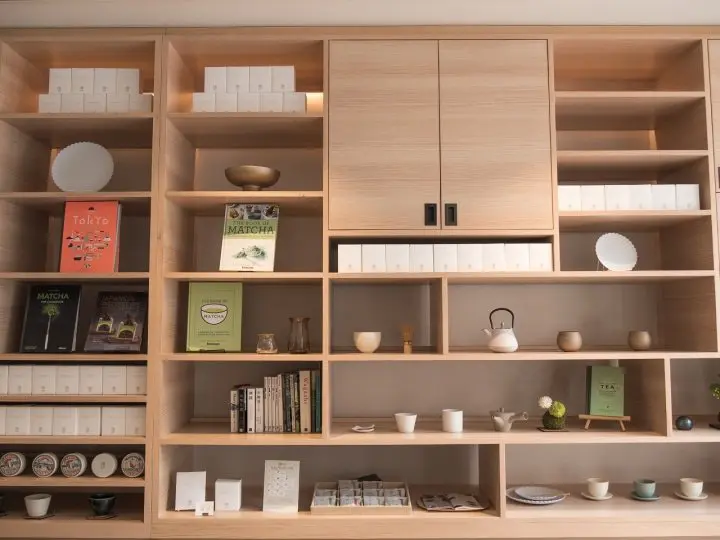
The wall displays various books, teas, and tea utensils
Katsuno-san goes on to explain that although tea is a part of everyday life for Japanese people, it’s often overlooked and taken for granted. The hotel allows guests to reconnect with tea on various levels, a beverage that has played an integral part in Japanese culture for hundreds of years.
CHAYA 1899 TOKYO on the first floor of the hotel acts as a gateway to help people reconnect with tea. It of course serves the standard hot tea beverages—sencha, black tea made with tea leaves grown in Japan (wakōcha), and roasted tea, hōjicha. However, it also serves things like tea lattes, tea parfaits, and even sausages that have tea leaves inside. The aim is to provide a casual atmosphere for tea enjoyment.
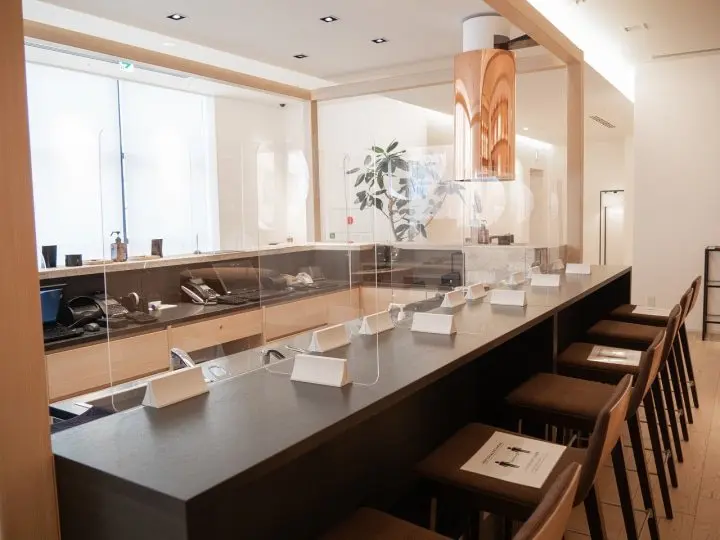
The tea counter on the 2nd floor is a place for guests to enjoy various teas
While the CHAYA 1899 TOKYO café is available for anyone to use, the hotel also has a special tea counter on the second floor where guests can come and have a cup of tea or even matcha prepared especially for them. The tea used here is sourced from a farmer in Sayama (Saitama prefecture) who is very open to the evolution of tea and trying new ideas.
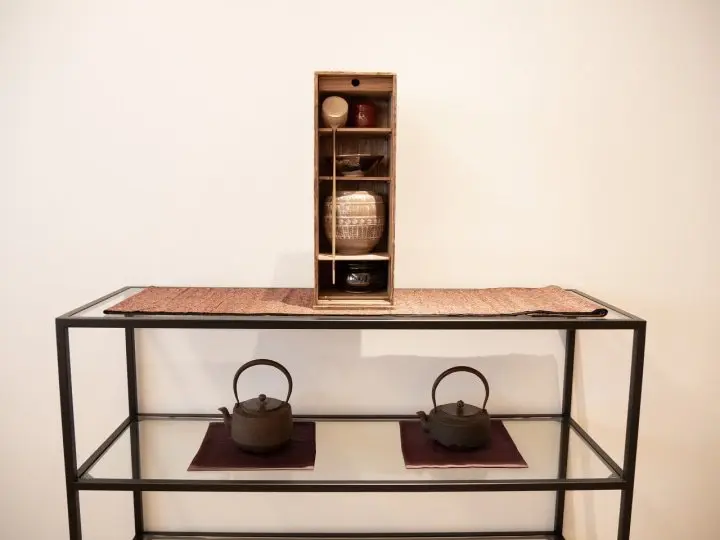
High-class tea utensils on display
Depending on the time you come to the tea area, you might even run into one of the resident nihoncha advisors who can answer any questions you might have about tea and teach you how to prepare it in the best way. This area is available for unlimited use by guests—you can have as many cups of tea as you’d like—and the service is included in the hotel stay. You can also of course come down to the tea counter to check out the books on the shelves that are available for guests to read, or even just for a chat. Katsuno-san says this is the place where hotel staff can get to know the guests better as well as offer tips and advice for their stay.
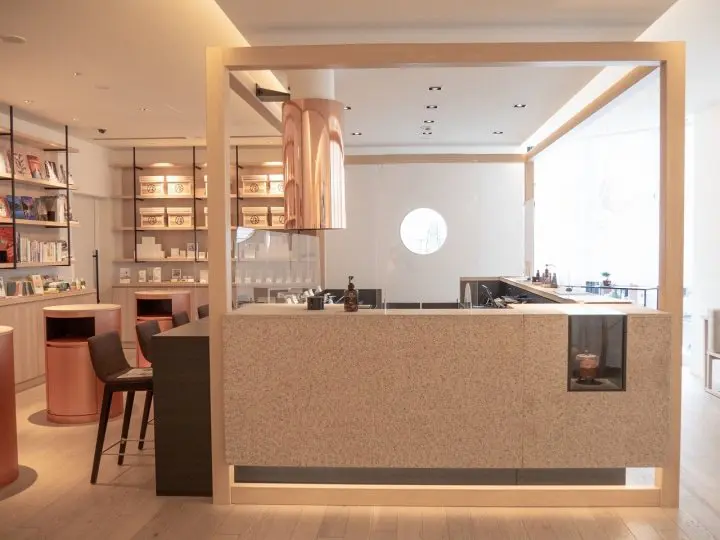
The design of the front desk was inspired by that of a traditional tea room, complete with a round window
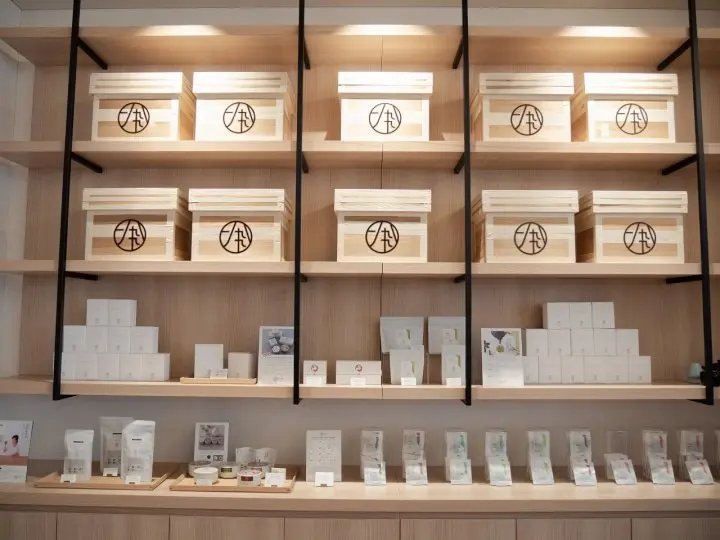
Various teas for sale in the shop
The second-floor is also home to the hotel shop and front desk. Here, you can find for sale various tea flavors and types, tea utensils, items that promote a healthy lifestyle, and even ceremony-grade matcha that is used by chanoyu practitioners.
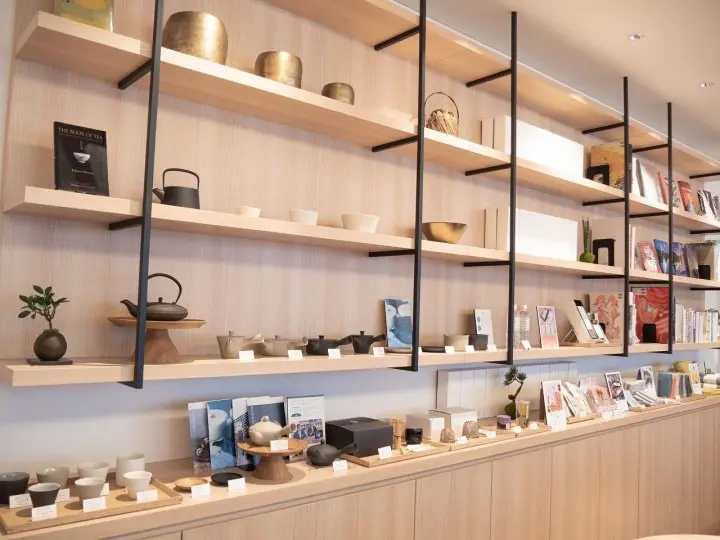
Everything you need to prepare tea is available in the shop
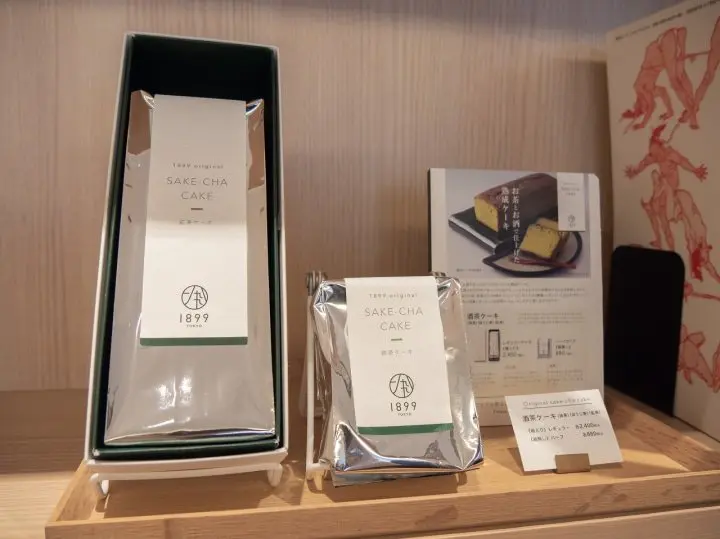
Sake-cha Cake—cake made with sake and tea, a favorite among guests and café-users
Another way that the hotel is working to increase interest in tea is by holding “Tea College” seminars in which participants can learn about brewing tea, making tea lattes, and even ways of enjoying tea in other non-traditional ways. Due to COVID-19, these classes have recently been held online, but all necessary utensils are mailed to the attendees so they can actively participate at home.
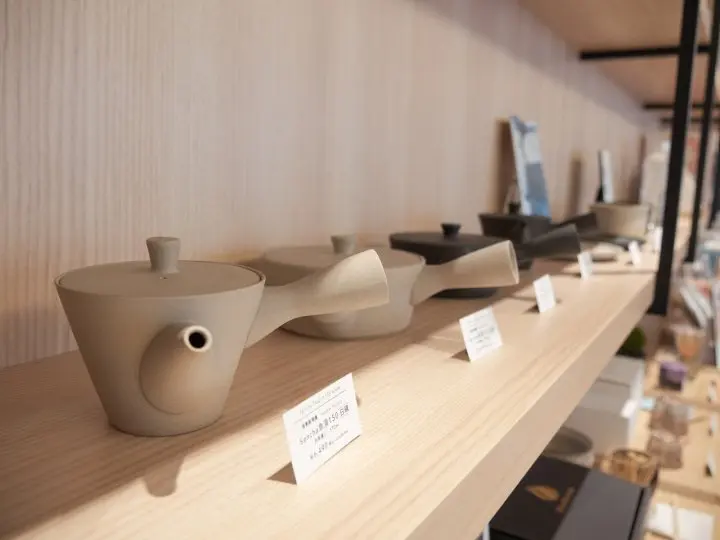
Traditional kyusu tea pots in various shapes
“Because this hotel was built as a concept lifestyle hotel, it’s quite different from a business hotel,” Katsuno-san explains. None of the rooms have desks like you would expect in a business hotel. This is because the rooms have been designed to maximize the tea experience. The hotel is there to allow the guest to get away from it all, to experience the world of tea in its own bubble.
Katsuno-san shows me to the first and best room on the top floor of the hotel. As we get off the elevator, I notice a kōgō (traditional incense container used in tea ceremony) displayed on a shelf facing the elevator.
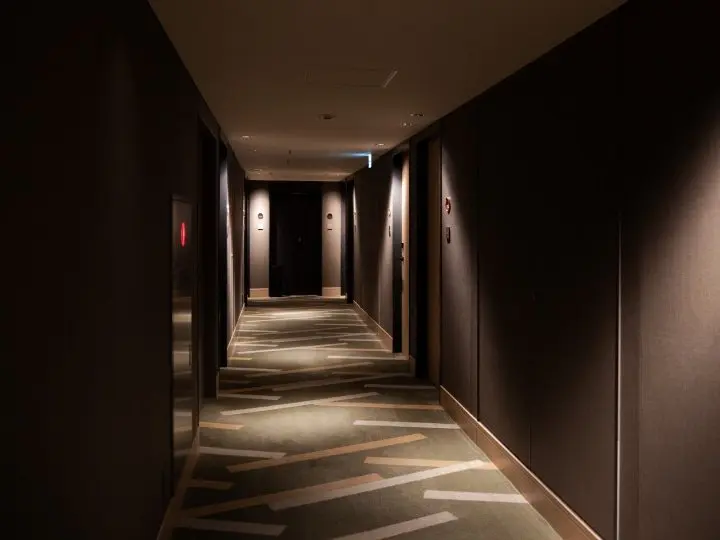
The pattern on the hallway carpet is a recurring motif throughout the hotel
The fragrance of incense is soothing, and the moody lighting allows me to feel like I really have stepped out of the everyday into a special dimension, where time is irrelevant.
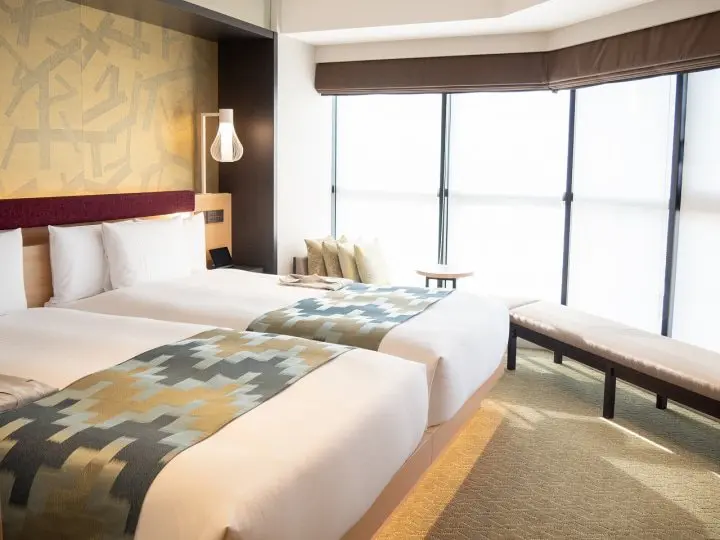
The Corner Deluxe Twin room
The Corner Deluxe Twin room is the most spacious room type available, only one on each floor of the hotel.
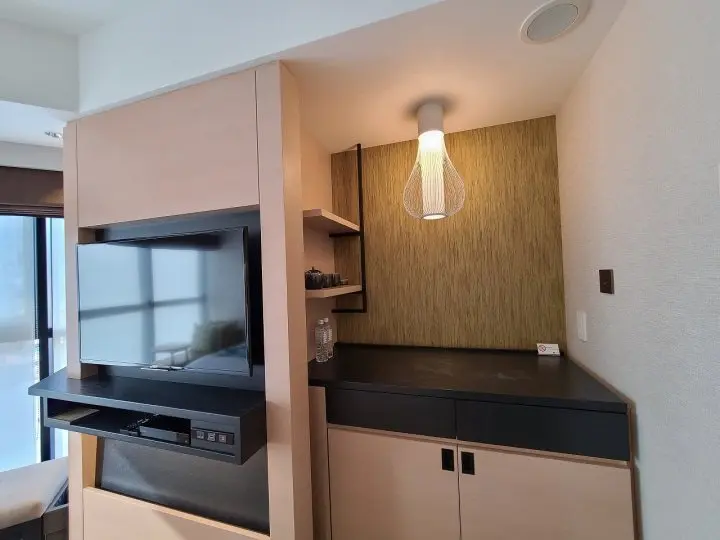
There are no desks in this room, but it does have a counter for preparing tea
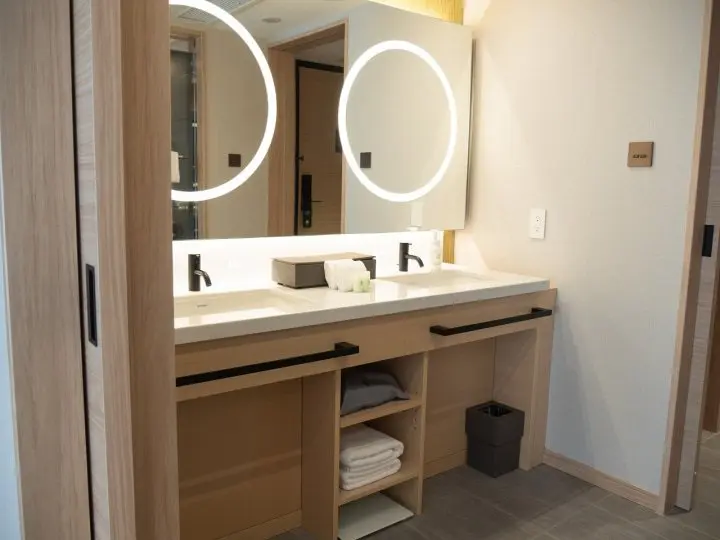
There’s plenty of room to get ready with this large mirror and two sinks
Large windows covering a large part of the room, it also has the best view. There is a small walk-in closet, as well as separate bath and toilet.
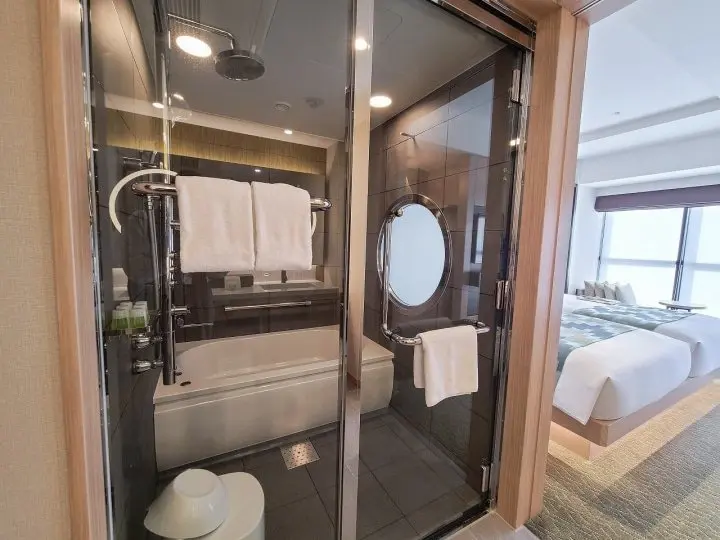
The bath features a rain shower
With its twin beds, this room is perfect for two people to use comfortably.
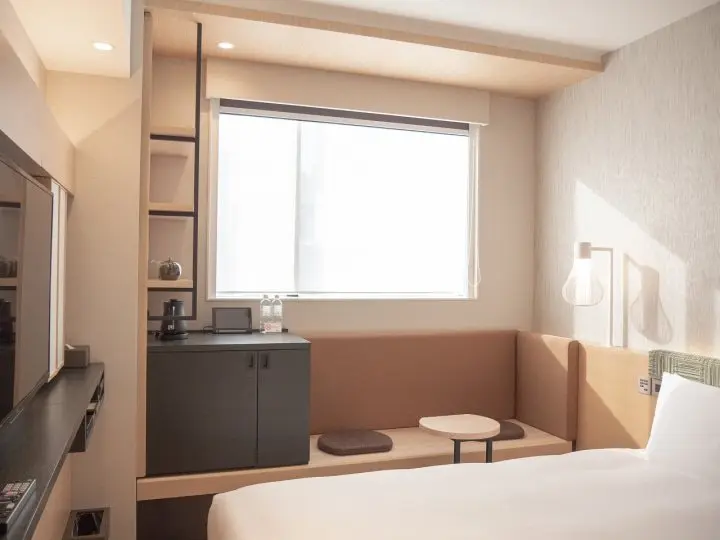
Superior Double A - Iori: a quiet space
The Iori room is more compact, measuring at 20 square meters, and it is designed as a chic, quiet space. Instead of a desk, guests will find a small table with bench-style seating, similar to what you would find at an outside tea gathering.
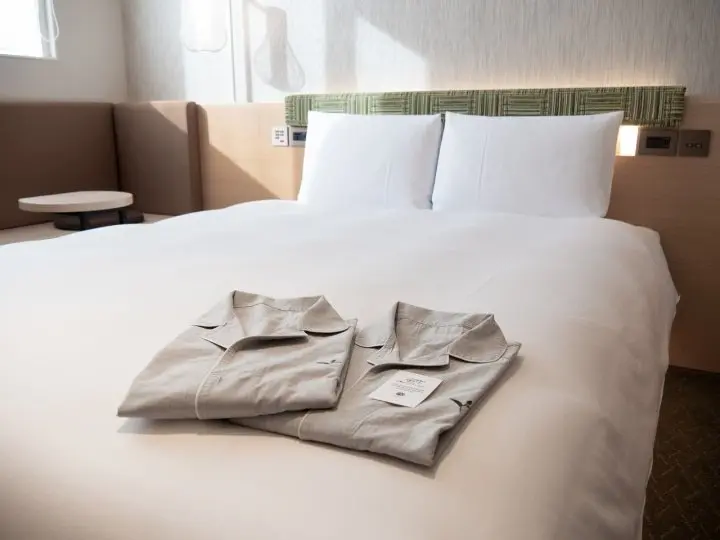
The colors of the room décor and the design have been utilized to make the room feel spacious, with different types of wallpapers on each wall and varying ceiling heights reminiscent of traditional Japanese architecture. The shelves on the wall are also inspired by the shelves that are found in traditional small-sized tea rooms.
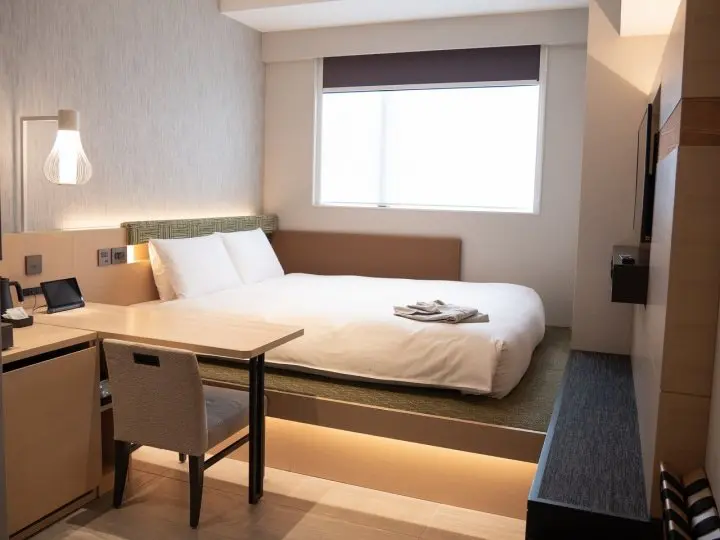
Superior Double B - Engawa
Engawa, the room I will be staying at, has its own unique features. Although it has a desk, the desk seems to be more designed like a tea counter rather than a place for work. Another noticeable difference is that the beds in this room are on a raised platform. The act of coming up onto the platform reminds me of the way one enters a traditional tea house, sliding through the small nijiriguchi entrance.
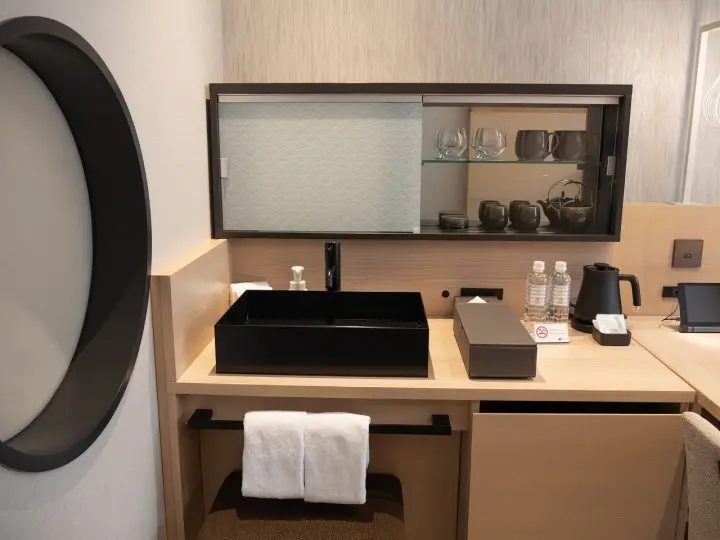
The sink is also right next to the desk, purposefully designed that way to be convenient for tea brewing.
The round window of the bathroom seen in the photo above is also something often found in traditional tea rooms.
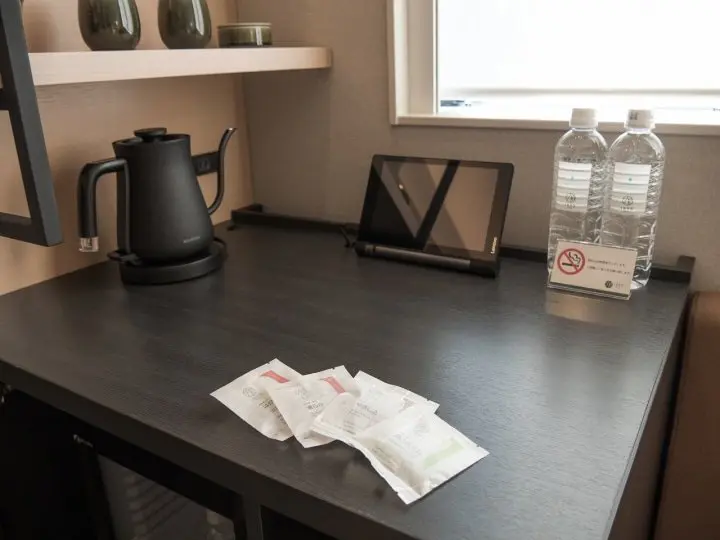
Mineral water and purified water, complete with a Balmuda kettle
All the rooms have bottles of mineral water (for drinking as-is) and purified water (ideal for tea). Great care has been put into hiding any aspects of the room that remind the guests of the outside world—the refrigerator is hidden behind a door, the safe for valuables is conveniently tucked away in a drawer. As for the beds, they all use Airweave mattresses for an excellent sleeping experience.
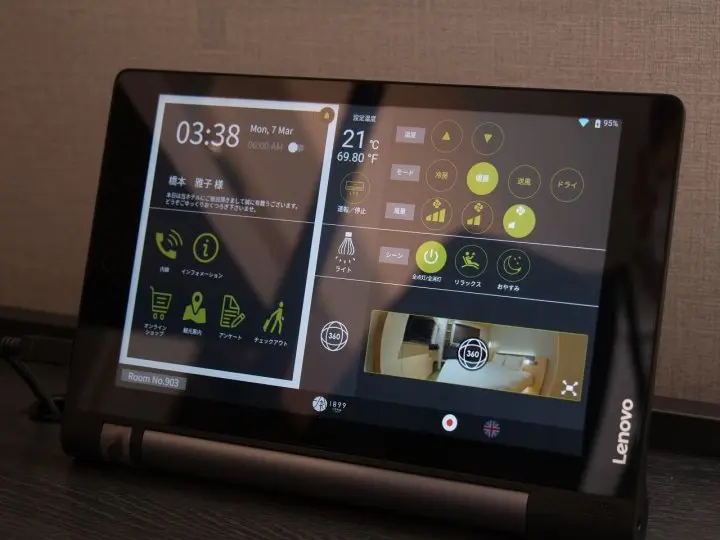
There is also a digital tablet in every room which can be used for room service, buying things from the online shop, and adjusting the lighting. This tablet also allows you to check out of the hotel without having to stop by the front desk.
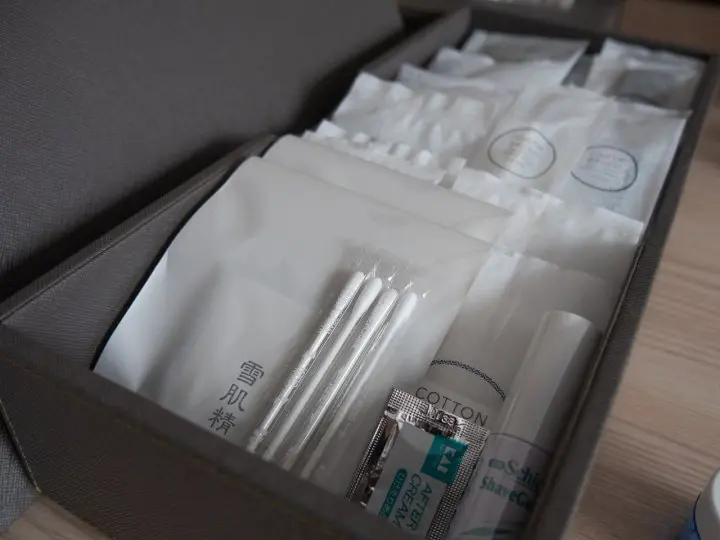
While standard amenities are available in the room, the hotel also offers has cellphone chargers, curling and straightening hair irons, ice buckets, and sommelier knives available for guests to rent for free.
As we wrap up our interview, Katsuno-san wishes me an enjoyable stay. I’m almost ready to go check out my room, but first thing’s first: what kind of tea-lover would I be if I didn’t try the 1899 Tea Parfait?
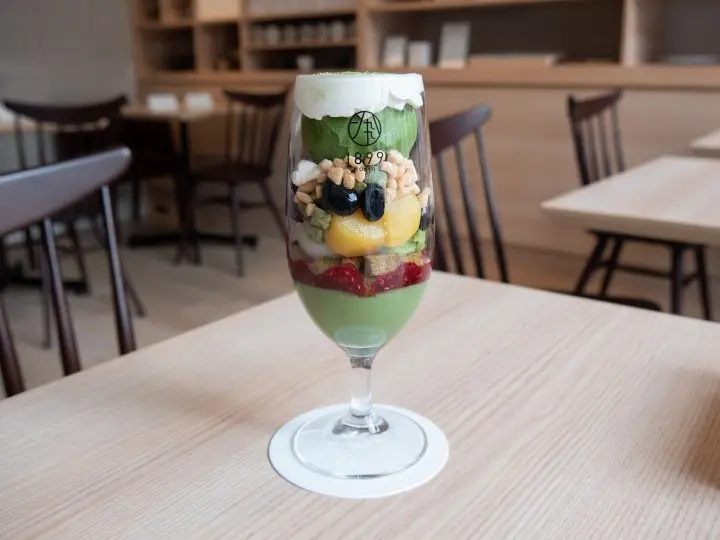
The parfait is a new addition to the café’s menu, and features all my favorite ingredients: matcha ice cream, shiratama (a type of mochi), chestnuts, kuromame (sweetened black soybeans), matcha pudding, and a mixed berry jam. I take a few bites and experience the optimal combination of flavors and textures, just the perfect amount of sweetness, balanced by the acidity of the berry jam.
My sweet tooth satisfied, I head over to my room on the 9th floor. For security purposes, only those with a room key can access floors above the 2nd floor.
Everything in the hotel is tea-themed—even the “9th floor” sign is designed in the shape of a chasaji, a spoon used for scooping tea leaves.
Although the rooms aren’t designed for work, if you’re a creative like me and prefer unique environments over all-business spaces, this room is actually an excellent place to concentrate. I especially love having easy access to the tea and beverage area.
Each room is also equipped with a Balmuda tea kettle for boiling water to maximize the tea experience. With this kettle, even the simple act of pouring the hot water into the teapot is enjoyable, and I’m impressed that so much thought has been put into such a simple aspect of the guest’s stay.
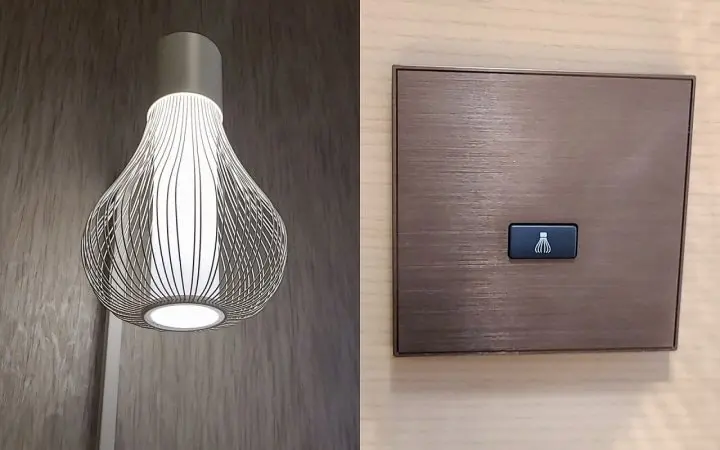
A delight for any matcha-lover: the light next to the bed is shaped like a chasen (a whisk used for preparing matcha)
I change into the comfy room slippers and take a look inside the bathroom.
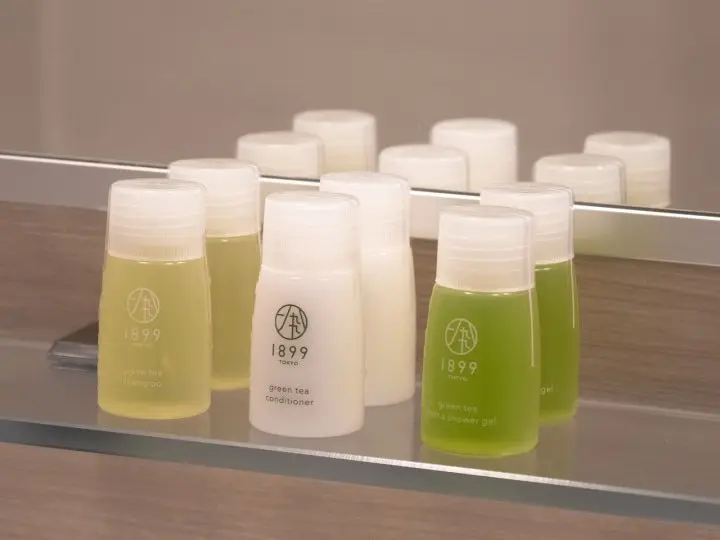
There is a pleasant lingering green tea scent, likely coming from the shampoo and body wash made with green tea.
As it’s approaching dinner time, I decide to go down to the front desk on the 2nd floor and ask for restaurant recommendations. The café isn’t currently open at dinnertime due to the pandemic, but there are many small restaurants in the area. I ask the lady at the front desk if she knows of any delicious places. The hotel has a list of restaurants they can recommend, categorized by type of food. The staff is very friendly and helpful, making the interaction very pleasant. I decide that I am feeling in the mood for some oven-baked pizza that I can eat in my room, and she promptly calls the restaurant for me to see if they do take-out.
A short walk and back and I am back in my room, enjoying my pizza.
All that’s left is some tea time and a relaxing bath with bath powder (which also has tea in it).
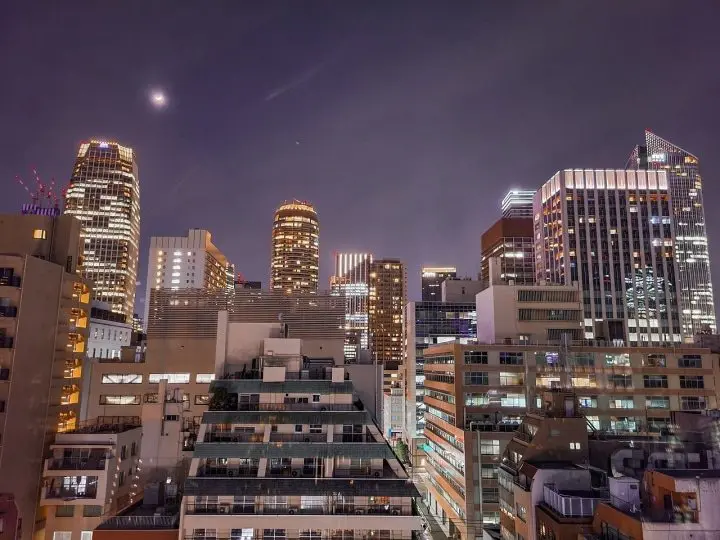
The night-scape visible through my 9th floor window is truly beautiful, offering a peak of Tokyo Tower lit up in orange and magenta.
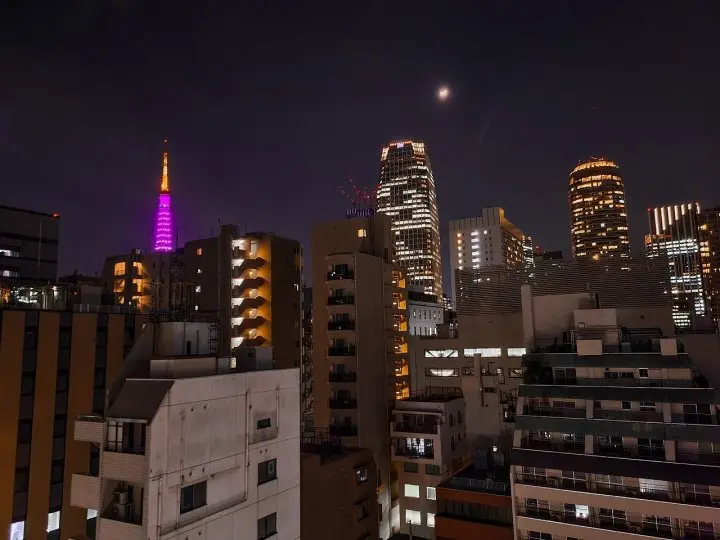
The tip of Tokyo Tower peeking out from behind the buildings
After a well-rested sleep, I wake up ready to enjoy another one of the hotel’s perks: its breakfast buffet.
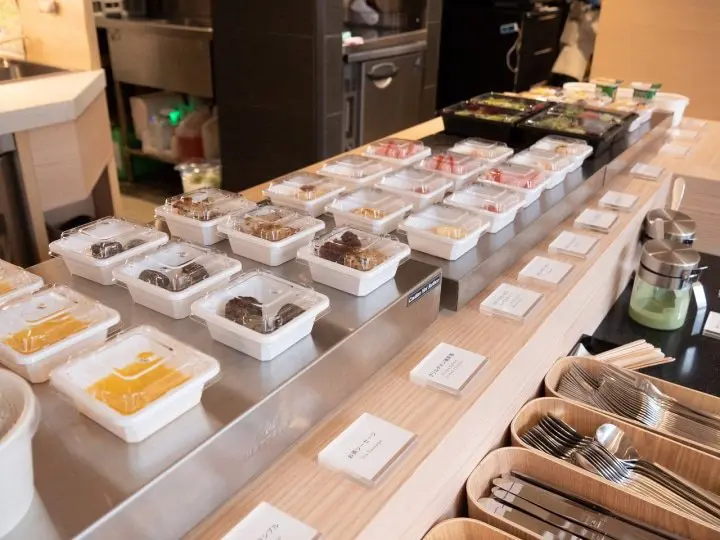
The breakfast buffet
The breakfast option is available to guests for ¥1,700 (tax included). It’s mainly western-style, featuring dishes like scrambled eggs, grilled chicken, and my favorite, tea sausage. While the menu sometimes changes due to ingredient availability, dishes are made to incorporate tea into their ingredients, such as matcha bread and matcha Caesar salad dressing. As a countermeasure against the spread of COVID-19, all the dishes are currently served in small, individually packaged portions.
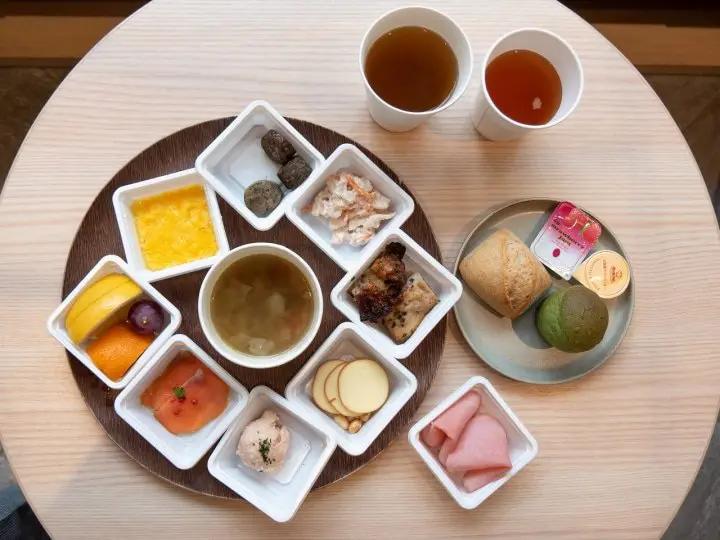
After my healthy and delicious breakfast, I prepare myself to return to the reality of the outside world. Although I feel nagori oshii—regret at having to part ways with this lovely place, I also feel rejuvenated and ready to face the day.
I am an actress and model living in Japan. Tokyo Ryokan Stories is my essay series about less-known but amazing ryokan and hotels in Tokyo.























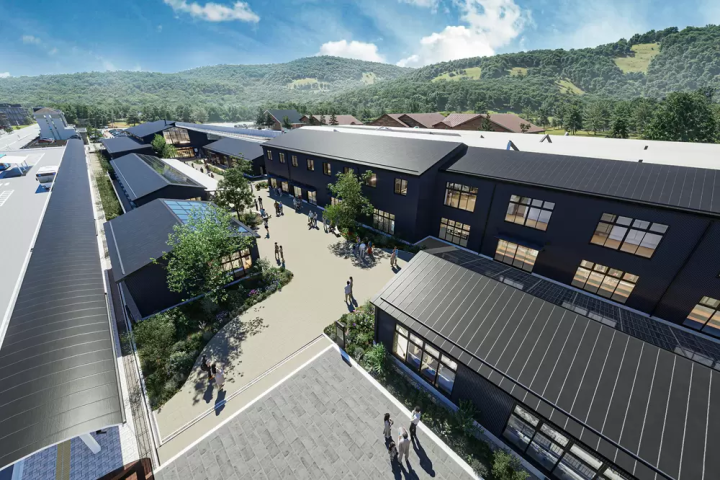
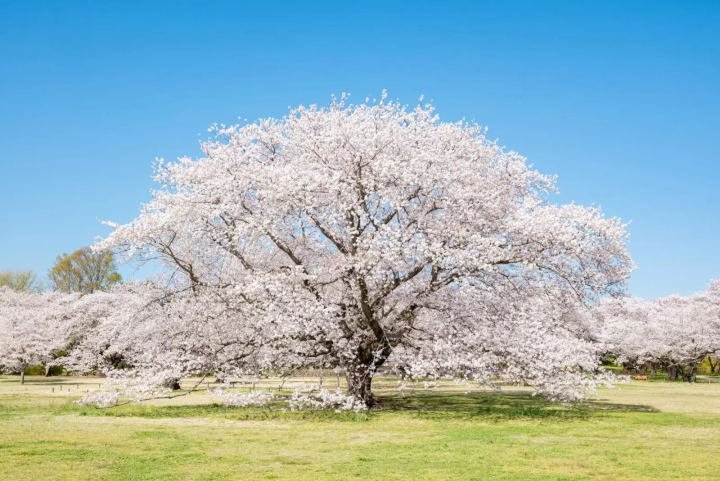
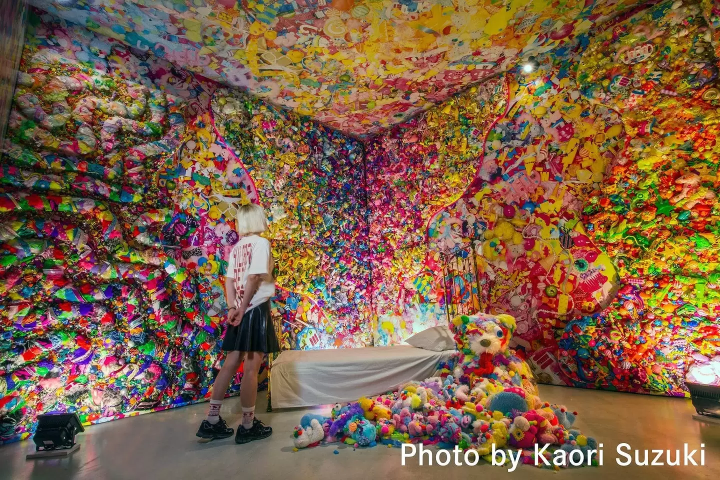
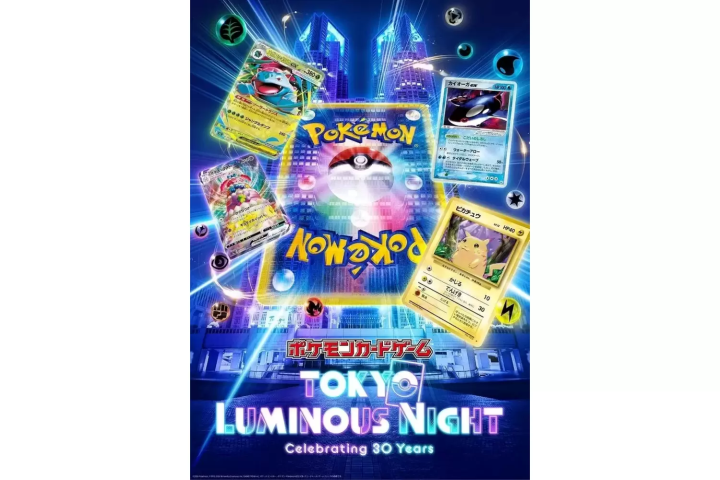






![[Fukui Prefecture] Eat, drink, and take home! Enjoy Tsuruga City's gourmet food and souvenirs](https://resources.matcha-jp.com/resize/720x2000/2026/02/12-258491.webp)
![[Experiences] South Osaka & Wakayama Factory Tours|Learn Japanese Craftsmanship Through Hands‑On Experiences](https://resources.matcha-jp.com/resize/720x2000/2025/11/06-249221.webp)
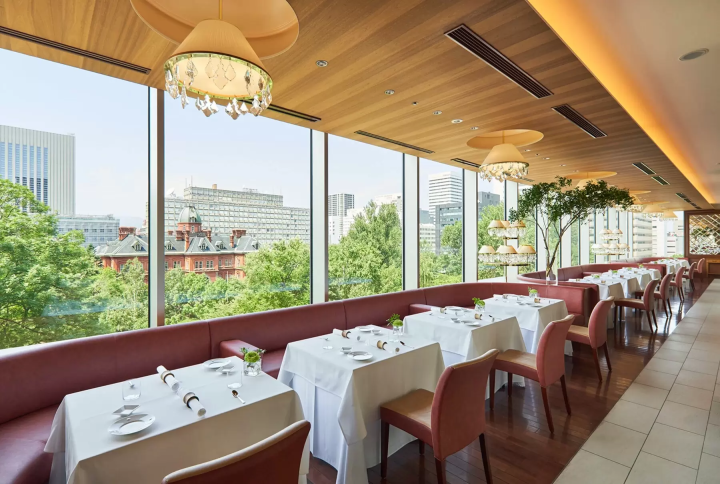
![[ Kusatsu City Shiga Prefecture ] It's not just Lake Biwa! Here are two must-see spots for history buffs](https://resources.matcha-jp.com/resize/720x2000/2026/02/18-259148.webp)
